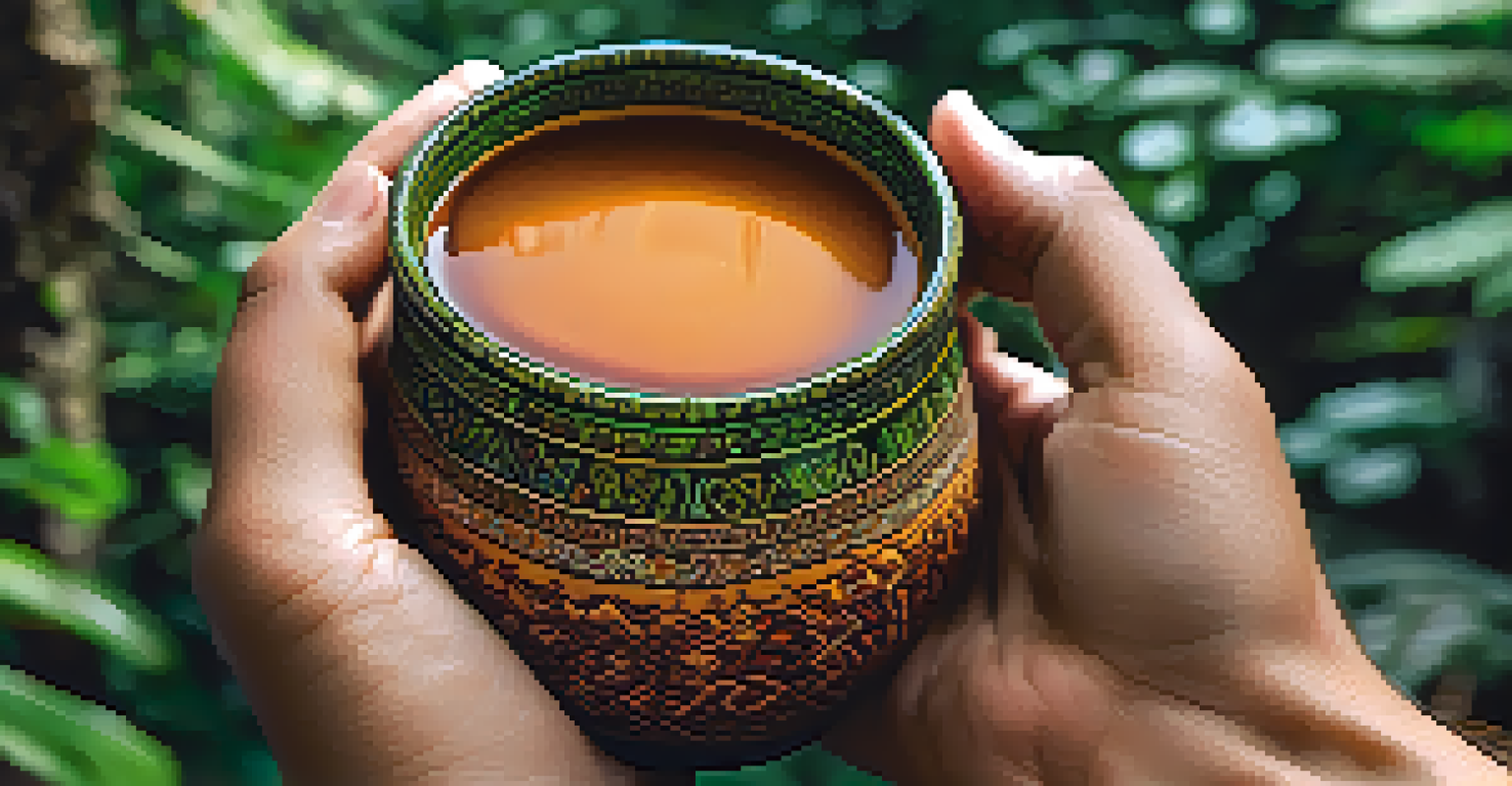The Role of Ayahuasca in Modern Social Justice Efforts

Understanding Ayahuasca and Its Cultural Significance
Ayahuasca is a traditional plant medicine originating from the Amazon rainforest, primarily used in spiritual ceremonies by Indigenous communities. This brew, made from the Banisteriopsis caapi vine and other plants, has been revered for its ability to induce profound introspection and emotional healing. Its cultural significance extends beyond mere substance; it represents a connection to ancestral wisdom and holistic approaches to health and well-being.
Ayahuasca is not just a tool for personal healing; it can also be a bridge to understanding and advocating for social justice.
In recent years, Ayahuasca has garnered attention in the West, attracting people seeking alternative healing methods. This interest has sparked conversations about the importance of respecting its origins and the Indigenous practices surrounding its use. As people participate in Ayahuasca ceremonies, they often find themselves confronted with their own biases and privileges, leading to a deeper understanding of social issues.
The growing popularity of Ayahuasca has prompted discussions about its role in modern society, particularly regarding social justice. By fostering empathy and self-awareness, Ayahuasca experiences can inspire individuals to engage more meaningfully with issues of inequality and injustice.
Ayahuasca as a Tool for Personal Transformation
One of the most profound aspects of Ayahuasca is its potential for personal transformation. During ceremonies, participants often experience intense emotional releases, gaining insights into their lives and the world around them. This transformative process can lead to a renewed sense of purpose, motivating individuals to take action toward social change.

For many, the journey through Ayahuasca is not just about personal healing but also about understanding one's role in the broader societal context. Participants frequently report heightened empathy toward marginalized communities and a desire to advocate for justice. This shift in perspective can be a powerful catalyst for social activism.
Ayahuasca's Role in Healing
Ayahuasca serves as a powerful tool for personal transformation and emotional healing, fostering deeper connections to oneself and the community.
Moreover, the shared experience of Ayahuasca ceremonies fosters a sense of community among participants. As people come together to explore their vulnerabilities and shared humanity, they often form bonds that inspire collective action in social justice efforts.
Building Empathy Through Ayahuasca Experiences
Empathy is a crucial component of social justice, and Ayahuasca has a unique way of cultivating it. By encouraging participants to confront their own pain and biases, the brew can create a profound sense of connection with others. This emotional awakening is vital in understanding the struggles faced by marginalized groups.
In the heart of Ayahuasca lies the potential for profound empathy and connection, allowing us to engage more deeply with the struggles of others.
As individuals process their Ayahuasca experiences, many find themselves more attuned to the systemic injustices present in society. The insights gained during these ceremonies often motivate them to engage in advocacy work or support social justice initiatives. Ayahuasca thus serves not only as a personal healing tool but also as a bridge to collective action.
Moreover, the storytelling aspect of sharing Ayahuasca experiences can amplify these lessons. When participants share their journeys, they highlight the interconnectedness of human experiences, further nurturing empathy and understanding among diverse groups.
Ayahuasca and Indigenous Rights Advocacy
The rise of Ayahuasca in Western culture has brought attention to the rights and struggles of Indigenous peoples who have traditionally used this sacred plant. This newfound interest can serve as a platform for advocating Indigenous rights and preserving their cultural heritage. By understanding the significance of Ayahuasca, participants can become powerful allies in these movements.
Advocacy for Indigenous rights often intersects with environmental justice, as many Indigenous communities face threats from deforestation and industrialization. As Ayahuasca ceremonies raise awareness about these issues, participants are encouraged to support initiatives that protect both the land and the cultural practices of Indigenous peoples.
Advocating for Indigenous Rights
The rise of Ayahuasca in Western culture highlights the need to respect Indigenous practices and advocate for their rights and cultural heritage.
Additionally, many organizations working to uphold Indigenous rights are also engaged in educating the public about the ethical implications of using Ayahuasca. By fostering an understanding of its origins and the struggles faced by Indigenous communities, advocates can help create a more respectful and informed approach to its use.
Promoting Mental Health Awareness Through Ayahuasca
Mental health is an essential aspect of social justice, and Ayahuasca has emerged as a potential tool for promoting mental well-being. Many participants report significant improvements in their mental health following Ayahuasca ceremonies, finding relief from issues like depression and anxiety. This healing journey can empower individuals to speak up about their struggles, reducing stigma around mental health.
By sharing their experiences with Ayahuasca, participants can contribute to broader discussions on mental health and access to care. This is particularly important for marginalized communities, who often face additional barriers to mental health support. Ayahuasca can thus act as a bridge, helping individuals connect their personal healing journeys to larger societal conversations.
Moreover, the insights gained during Ayahuasca experiences can inspire participants to advocate for mental health resources and initiatives. As they recognize the importance of mental well-being in achieving social justice, they may become more involved in efforts to ensure equitable access to mental health care for all.
Navigating the Ethical Considerations of Ayahuasca Use
As the popularity of Ayahuasca grows, so do the ethical considerations surrounding its use. It is essential to approach Ayahuasca with respect for its cultural origins and the communities that have long practiced its use. Without this awareness, the risk of cultural appropriation and exploitation increases, potentially undermining the very social justice efforts it aims to support.
Participants must also be mindful of the power dynamics at play in Ayahuasca ceremonies. Ensuring that Indigenous voices are heard and that their practices are honored is crucial in maintaining the integrity of these experiences. This includes supporting Indigenous-led ceremonies and initiatives, rather than solely seeking out commodified versions.
Empathy and Social Justice
Ayahuasca experiences promote empathy, encouraging participants to confront their biases and engage in social justice initiatives.
In this context, ethical engagement with Ayahuasca becomes a form of social justice itself. By advocating for responsible use and promoting Indigenous rights, participants can contribute positively to the broader narrative of Ayahuasca's role in society.
The Future of Ayahuasca in Social Justice Movements
Looking ahead, the role of Ayahuasca in social justice movements is likely to continue evolving. As more people experience its transformative power, the conversations around empathy, healing, and advocacy will expand. This could lead to greater collaboration between Indigenous communities and those seeking to engage in social justice work.
Furthermore, as awareness grows about the benefits and challenges of Ayahuasca use, there may be an increase in responsible and ethical practices within the community. This shift can help ensure that Ayahuasca remains a tool for healing and connection rather than a commodity stripped of its cultural significance.

Ultimately, the future of Ayahuasca in social justice will depend on the choices made by its users and advocates. By prioritizing respect, understanding, and collaboration, Ayahuasca can play a meaningful role in fostering social equity and justice for all.